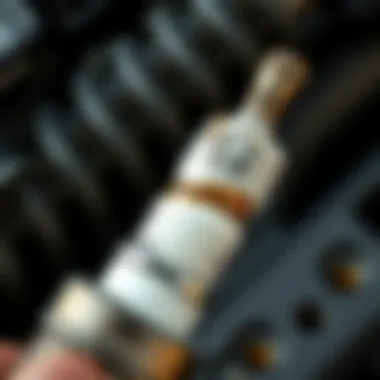Honda Accord Spark Plug Replacement Costs Explained


Intro
Replacing spark plugs in a Honda Accord can seem like a small task, but it can have significant impacts on your vehicle's performance and longevity. Spark plugs play a crucial role in the ignition process, igniting the air-fuel mixture in the engine cylinder and thus keeping your car running smoothly. Ignoring them can lead to decreased fuel efficiency, rough engine idle, or even thorough engine failure. It’s essential to understand not only the necessity of maintaining these components but also the associated costs involved in their replacement.
In this guide, we’ll delve into the financial aspects of spark plug replacement for Honda Accords, exploring various factors influencing costs such as labor, parts, and specific engine configurations. Additionally, we aim to shed light on the essential maintenance practices that could save you money in the long run.
Overview of Honda Accord
The Honda Accord, a staple in the automobile industry, stands as a testament to innovation, reliability, and efficiency. This article sheds light on the importance of understanding spark plug replacement costs related to this popular model. It is vital not only for current owners but also for potential buyers who may want to assess maintenance costs and vehicle longevity.
First off, the spark plugs in a Honda Accord play a crucial role in its overall performance. They directly influence engine efficiency and fuel consumption, which makes comprehending their replacement costs an integral part of ownership. One often overlooked aspect is how neglecting these components can severely impact the vehicle’s performance, potentially causing more significant financial burdens down the line.
History and Evolution
The Honda Accord has evolved significantly since its inception in the mid-1970s. Initially launched as a compact model, it swiftly transformed into a mid-size sedan that captured the hearts of consumers across the globe. Each generation introduced innovations that improved both comfort and efficiency, showcasing Honda's commitment to staying ahead in the automotive race. As technology advanced, so did the design and functionality of the Accord. More sophisticated fuel injection systems and ignition mechanisms made each newer model more efficient, but they also created a more complex relationship with components like spark plugs.
As the vehicle became more technologically advanced, the nature of its spark plugs changed, too. Earlier models utilized more basic components, while newer versions tend to employ specialized materials such as iridium and platinum, which offer longer lifespans but also bring varied replacement costs.
Significance in the Automotive Market
The Honda Accord remains a significant player in the automotive market, winning multiple awards for reliability and safety. It’s frequently in the running for top spots in various automotive comparison reviews, highlighting its favorable value proposition. The model's reputation for longevity and low maintenance costs can be a strong selling point. Aero dynamics, fuel efficiency, and safety developments play into its desirability, making it an attractive option for both families and individuals alike.
Knowing the intricacies of models like the Honda Accord is particularly important due to the vehicle’s extensive service history and multiple variations over the years. For prospective buyers evaluating a used Accord, having a solid grasp of its maintenance requirements, especially regarding spark plugs, can deliver peace of mind and inform better decisions.
In summary, the Honda Accord’s stature in the market not only speaks volumes about its quality but also amplifies the need for understanding associated maintenance costs, specifically spark plug replacements. Being equipped with this knowledge can significantly impact your experience as an owner, steering clear of avoidable expenses and ensuring that the car maintains its peak performance for years to come.
Importance of Spark Plugs
Spark plugs play a pivotal role in a vehicle's operation, more so in a car as widely regarded as the Honda Accord. These small, seemingly mundane components are essential for a vehicle's ignition system, converting electrical energy into the heat needed to ignite the air-fuel mixture in the engine cylinders. In essence, without functional spark plugs, the engine cannot run effectively, making their importance undeniable.
Role in Engine Performance
The performance of an engine can be closely tied to how well its spark plugs are doing their job. Faulty or worn spark plugs can lead to a variety of engine issues, such as misfires, which occur when the spark plug fails to ignite the fuel-air mixture at the appropriate time. This can throw a wrench into the smooth operation of an engine, leading to loss of power and rough idling.
Furthermore, if just one spark plug is malfunctioning, it can cause the engine to run unevenly, making the driving experience quite unpleasant. Think of it like trying to walk with an uneven shoe – it makes each step difficult and uncomfortable. Replacing worn spark plugs can restore this balance, enhancing not only the engine's performance but also your overall driving satisfaction.
Impact on Fuel Efficiency
Fuel efficiency is another area where the state of the spark plugs has a significant impact. Worn-out or incorrect spark plugs can lead to incomplete combustion, meaning not all fuel gets burned effectively. This inefficiency translates into increased fuel consumption, effectively making the driver pay more at the pump.
By ensuring your spark plugs are in good shape, you can optimize the combustion process, helping your engine work harmoniously. A well-tuned engine, with functioning spark plugs, ensures that you get the best mileage possible. According to some estimates, replacing worn spark plugs can lead to fuel economy improvements of up to 30%. What a return on investment!
"Taking care of your spark plugs isn’t just about performance; it’s about wallet-friendly driving too."
In summary, spark plugs are vital not only for maintaining robust engine performance but also for enhancing fuel efficiency in your Honda Accord. Paying attention to these components can save money in the long run while ensuring a smoother and more enjoyable drive. Ignoring them might be a gamble you don’t want to take.
Common Signs of Worn Spark Plugs
Understanding the common signs of worn spark plugs is essential for any Honda Accord owner who values their vehicle's performance. Spark plugs might seem small and insignificant, but they play a huge role in ensuring your engine runs smoothly. When they start to wear down, you might not notice it right away, but the effects can quickly escalate. Knowing the signs helps you avoid bigger issues down the line, which can lead to bigger repair bills and stress. Here, we will cover three key symptoms: engine misfires, poor acceleration, and increased emissions.


Engine Misfires
One of the first indicators that your spark plugs may be nearing the end of their lifespan is engine misfires. When the spark plug fails to ignite the air-fuel mixture in the combustion chamber properly, it leads to a misfire. You might notice your Honda Accord shaking or stumbling during acceleration, almost like it’s having a dance-off with no rhythm.
Ignoring this symptom could lead to further engine damage. Replacing worn spark plugs can restore the balance and keep your engine happy. Remember, it's not just about smooth driving; it's about the longevity of your engine.
Poor Acceleration
Another common sign that your spark plugs are giving out is poor acceleration. When your car struggles to pick up speed, even when you press the gas pedal, the spark plugs might be the culprits. They can affect the overall engine efficiency, making you feel like you're driving a tortoise rather than a reliable sedan. If you find yourself pressing harder on the gas but your Accord still feels sluggish, don't just chalk it up to the need for a caffeine fix. Check your spark plugs.
A timely replacement can significantly improve your car's responsiveness and enhance your overall driving experience. A smooth, responsive ride is essential for making those morning commutes tolerable.
Increased Emissions
Lastly, an often overlooked yet crucial sign of worn spark plugs is the increase in exhaust emissions. When spark plugs are not functioning correctly, they can lead to incomplete combustion. This inefficient burning results in excess hydrocarbons being emitted. If you start to notice that your check engine light flickers more than usual or if you smell gas when idling, it's your engine's way of waving a red flag.
Not only does this affect your vehicle’s performance, but it can also lead to your car failing emissions tests, which can cause more financial headaches. Keeping your spark plugs in good condition means contributing to a cleaner environment and saving yourself from costly repairs down the road.
Maintaining your spark plugs is not just a checklist item; it’s a crucial step for the performance and longevity of your Honda Accord.
In summary, being aware of these signs—engine misfires, poor acceleration, and increased emissions—can save you from costly repairs and keep your Honda Accord running at its best. It’s a wise investment of time and effort to check your spark plugs regularly.
Factors Influencing Replacement Costs
Understanding the factors that contribute to the cost of replacing spark plugs in a Honda Accord is vital for both car owners and enthusiasts. This knowledge can help avoid unwanted surprises when it comes time for maintenance. There are several key aspects to consider that can significantly affect total expenses, including the type of spark plugs used, variations in labor rates, and the frequency of maintenance needed. Delving into these elements provides a clearer picture of what to expect when handling spark plug replacements.
Type of Spark Plugs Used
Copper
Copper spark plugs are known for their excellent conductivity and relatively low cost. This makes them a popular choice among those who prioritize budget, particularly for older Honda Accord models. A notable characteristic of copper plugs is their quicker heat dissipation, which can enhance engine performance. However, one should also consider their short lifespan, often requiring replacement every 20,000 to 30,000 miles.
Among the advantages are the affordability and simplicity in installation. Yet, because they wear out faster than their counterparts, recurring costs can pile up, making them a less economical long-term solution.
Platinum
Platinum spark plugs provide a blend of performance and durability. These plugs are designed with a platinum center electrode, which extends lifespan to upwards of 60,000 miles under normal driving conditions. This longevity makes them a beneficial choice for many Accord owners who prefer fewer replacements amidst regular maintenance.
The key feature of platinum plugs is their ability to withstand higher temperatures, which promotes cleaner burn efficiency. The enticement of platinum, however, is often countered by a higher initial cost compared to copper. Still, the decreased frequency of replacement often offsets the upfront expense, rendering them a strong option.
Iridium
Iridium spark plugs stand at the pinnacle of spark plug technology, exhibiting remarkable endurance and efficient combustion. These plugs typically boast a lifespan of over 100,000 miles, positioning them as a premium investment for those looking to maximize performance and reduce service visits.
A defining aspect of iridium plugs is the small diameter of the center electrode, which allows for optimal ignition timing and improved fuel economy. Although they come with a hefty price tag, their long-lasting nature can mean more wrestling with less frequent changes. Still, the high initial costs can deter some enthusiasts from opting for this advanced option.
Labor Rate Differences
Dealerships vs. Independent Mechanics
When it comes to labor rates, there’s a significant trade-off between dealerships and independent mechanics. Dealerships often bring the advantage of specialized knowledge about Honda vehicles, which might lead to a higher quality of service. However, this expertise comes at a premium price, making it a less attractive option for cost-conscious consumers.


On the flip side, many independent mechanics offer competitive pricing and can deliver quality service, often at a fraction of the cost of a dealership. Yet, the lack of specific brand knowledge may lead to varying degrees of workmanship. Depending on the mechanic's experience with Hondas, this can potentially influence the effectiveness of the spark plug replacement process.
Regional Variations in Pricing
Geographic location also plays a significant role in pricing dynamics. In urban areas, labor rates tend to be higher due to increased demand and cost of living. Conversely, rural regions may present a more economical alternative but possibly at the sacrifice of service availability or expertise.
These regional pricing variations lead to disparities that can heavily impact the overall cost of spark plug replacements. Awareness of pricing trends in specific locations is crucial for individuals to get the best bang for their buck when maintaining their Honda Accords.
Frequency of Maintenance
Manufacturer Recommendations
Honda provides guidelines regarding maintenance intervals for spark plug replacements. Adhering to these recommendations is not only vital for vehicle performance but also crucial for maintaining warranty eligibility. Generally, Honda suggests replacing spark plugs every 30,000 miles for older models and every 100,000 miles for newer models using iridium plugs.
Following these suggestions can help avoid untimely failures that lead to costlier repairs down the line. Ignoring manufacturer guidelines may put a burden on both finances and vehicle reliability, so it’s always wise to refer back to the owner's manual.
Driving Conditions Impact
How and where a Honda Accord is driven can heavily affect spark plug longevity. For instance, city driving with frequent starts and stops can lead to quicker wear compared to highway driving, which tends to be less demanding on spark plugs.
Additionally, harsh weather conditions and uneven terrains can contribute to an accelerated decline in spark plug performance. Understanding the impact of driving conditions encourages Honda owners to be more proactive in their maintenance approaches, further highlighting the need for timely replacements as part of car care.
Typical Replacement Costs for Honda Accord
When you delve into the world of maintaining a Honda Accord, one of the key areas you'll want to explore is the typical replacement costs for spark plugs. This aspect provides valuable insight for both seasoned mechanics and car owners, ensuring that everyone is on the same page when it comes to financial planning for maintenance.
The costs involved with spark plug replacement can vary widely depending on several factors, including the type of spark plugs chosen and where the replacement work is done. Understanding these costs not only helps in budgeting, but also highlights the long-term savings associated with timely replacements. By investing in quality components and services, you can prevent costly engine issues down the line.
Cost of Parts
Comparison of Brands
When you're looking to replace spark plugs, the comparison of brands is crucial to make an informed decision. Different brands will often offer distinct pricing and performance characteristics. For instance, well-known brands like NGK, Denso, and Bosch tend to dominate the market. Each brand has its loyal following, thanks to the tried-and-true reliability shown in various models over the years.
Key characteristics of these brands include their reputation for quality and the longevity of their products. For example, NGK is lauded for its commitment to producing spark plugs that enhance engine performance while minimizing wear. Such factors make it a popular choice among Accord enthusiasts.
Comparing features like heat range, construction material, and design plays a pivotal role in selecting the right spark plugs. While premium brands may cost more upfront, they can significantly reduce the likelihood of engine misfires and performance dips, leading to better fuel efficiency and overall longer engine life.
Aftermarket vs. OEM Parts
Next on the agenda is examining aftermarket vs. OEM parts. Original Equipment Manufacturer (OEM) parts are produced by the same manufacturer that made the parts originally included in the vehicle. In contrast, aftermarket parts come from third-party manufacturers.
The key characteristics of OEM parts are their guaranteed compatibility and quality. They may be some of the more expensive options, but they often come with warranties that can offer peace of mind. Many Accord owners swear by OEM parts for this reason.
On the flip side, aftermarket parts are seen as a more cost-effective solution. They are often cheaper and may perform comparably to their OEM counterparts, especially from reputable manufacturers. However, you might run into variability in quality, which means research and reviews are essential before making a purchase.
The decision between aftermarket and OEM comes down to balancing cost against quality and peace of mind. Weighing these aspects is fundamental in developing an optimal replacement strategy, ensuring you get the best value for your investment as well as maintaining the integrity of your Accord's engine performance.
Cost of Labor


Labor costs can add significant expenses to your spark plug replacement. If you opt to visit a dealership for the service, you might pay a premium for their expertise and the brand name. Independent mechanics can often provide comparable quality service for a lower rate, making it a worthy consideration.
It's essential to get estimates and understand the labor rates in your area. Urban centers typically charge more compared to rural locales. It's about finding that sweet spot where quality is preserved without breaking the bank.
Overall Replacement Estimates
Combining all these factors, the overall replacement estimates can vary widely. If you go with a full OEM part replacement at a dealership, the costs can reach several hundred dollars. In contrast, choosing aftermarket parts and independent service could lower expenses to a fraction of that.
In summary, spark plug replacement is not just about the parts themselves but a combination of quality, labor, and type of service provider. By understanding these components, you can ensure that you're not only prepared for what's ahead but also keeping your Honda Accord in prime condition.
Do-It-Yourself Spark Plug Replacement
When it comes to maintaining your Honda Accord, replacing the spark plugs is an essential task that shouldn't be brushed under the rug. Many car owners often prefer taking their vehicles to the shop for repairs, but tackling this job yourself offers significant benefits. First off, it can save you a decent chunk of change that you'd otherwise spend on labor costs. Secondly, it's a great way to learn more about your car’s mechanics. Understanding how spark plugs fit into the grand scheme of engine performance can provide insights you wouldn't get just by handing the keys to a mechanic.
However, doing it yourself does require some preparation and know-how. So, let’s roll up our sleeves and dive into the nitty-gritty of replacing spark plugs on a Honda Accord.
Tools Required
Before you get your hands dirty, it’s crucial to have the right tools at your disposal. Missing even a small tool can turn what should be a straightforward job into a frustrating endeavor. Here’s a quick list of tools you'll need:
- Socket wrench set: A 3/8-inch ratchet with a spark plug socket will do the trick.
- Torque wrench: This ensures that your plugs are tightened to the manufacturer’s specifications.
- Screwdriver: A flat-head or Phillips-head screwdriver might come in handy for removing any engine cover.
- Spark plug gap tool: You’ll want to check the gap on the new plugs before installation.
- Dielectric grease: This can help provide a good seal and protect the plugs.
- Gloves and shop towels: Keeping your hands clean and the workspace tidy is always a plus.
Step-by-Step Guide
Replacing your spark plugs doesn't have to be rocket science. Here’s a step-by-step guide to making the process smoother:
- Gather Your Tools: Make sure everything is within arm’s reach before you start.
- Engine Cool Down: If the car has been running, give it some time to cool off. Working with hot engines is never a fun idea.
- Remove Engine Cover (if applicable): If your Accord has an engine cover, remove it so you can access the spark plugs.
- Disconnect the Battery: Safety first! Disconnect the negative terminal to prevent any electric shocks.
- Unplug Ignition Coil: Each spark plug might be covered by an ignition coil; carefully unplug these before proceeding.
- Remove Old Spark Plug: Using your socket wrench, unscrew the old spark plug. Keep an eye on how deep the plug sits—this will help you know how to set the new one.
- Prepare New Spark Plug: Check the gap on the new spark plug using your gap tool, and apply a small amount of dielectric grease on the threads.
- Install New Plug: Screw in the new spark plug by hand first, then tighten it with the socket wrench. Be careful not to over-tighten.
- Reattach Ignition Coil and Engine Cover: Put everything back together in reverse order.
- Reconnect the Battery and Start the Engine: Once everything is back in place, reconnect the negative terminal and start the engine to check if it runs smoothly.
Considerations and Risks
While swapping out spark plugs can be a rewarding task, there are considerations and risks to keep in mind.
- Incorrect Gap Settings: If the spark plug gap isn’t set correctly, it could lead to poor engine performance or misfires.
- Cross-Threading: Be cautious when screwing in the new plugs; cross-threading can damage the threads in the engine, leading to costly repairs.
- Falling Behind on Maintenance: This job might lead you to realize other maintenance tasks that need attention. Stay on top of routine checks!
- Using Incorrect Parts: Make sure the spark plugs you buy match the specifications for your Honda Accord. Using the wrong type can lead to problems down the road.
In the end, the DIY approach to spark plug replacement presents both advantages and possible pitfalls, but if done correctly, it’s a practical and cost-effective way to keep your Accord humming along smoothly.
Finale
Replacing spark plugs is a key maintenance task that can have a drastic effect on the performance and longevity of your Honda Accord. Timely replacements not only serve to keep the engine running smoothly but also help prevent further complications that could arise from neglected components. Understanding the costs associated with this process allows vehicle owners to budget accordingly and make informed decisions.
One of the critical elements highlighted throughout this article is the relationship between spark plug condition and overall engine health. Spark plugs may seem like minor components, but they play a vital role in combustion efficiency. Failing to replace them when worn can lead to misfires, reduced fuel efficiency, and increased emissions, ultimately costing more in repairs than the simple task of replacing the plugs themselves.
In terms of benefits, keeping track of your spark plug condition ensures a smoother ride and better fuel economy. It can result in fewer trips to the mechanic and less stress on the wallet. Not to mention, a well-maintained spark plug can extend the life of the engine and its other components, ensuring that your Honda Accord operates at its peak for many years.
In sum, while the initial cost of replacing spark plugs might appear daunting at first glance, it is essential to recognize the broader implications for vehicle upkeep and performance. Failing to act can lead to exponentially higher costs and inconvenience down the road.
Summary of Key Points
- Spark plugs are vital for engine performance, affecting combustion and efficiency.
- Timely replacements prevent issues such as misfires and poor acceleration.
- Various factors, including plug type and labor rates, influence replacement costs.
- Understanding these elements helps car owners make informed financial decisions about maintenance.
Final Recommendations
For Honda Accord owners, I recommend regularly inspecting your spark plugs, especially if you experience any signs of wear, such as engine misfires or reduced fuel economy. Additionally, consult the vehicle’s maintenance schedule for guidance on the ideal timing for replacements. If you're contemplating the replacement, consider using high-quality spark plugs like NGK or Denso, known for their durability.
Always weigh your options between dealership services and independent mechanics; sometimes, local shops provide just as good service at a fraction of the cost. Lastly, if you’re feeling adventurous and have some mechanical know-how, don’t shy away from a do-it-yourself replacement using the steps outlined earlier in the article.
By keeping your spark plugs in good shape, you ensure that your Honda Accord runs efficiently, safeguarding both its performance and your pocket.















